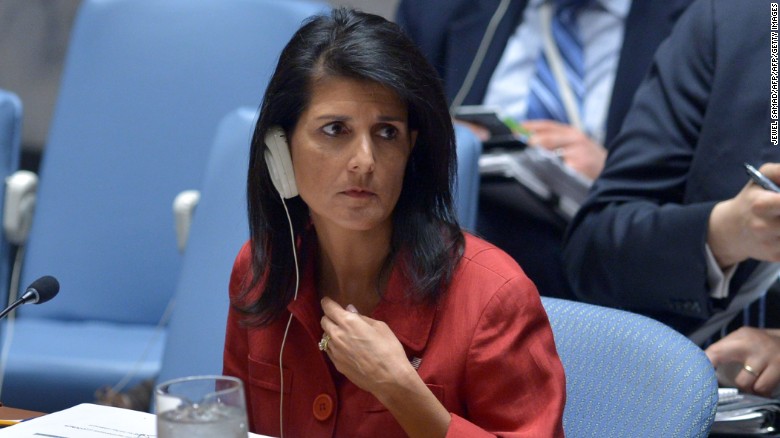Iran Must Do More Than Technically Comply, U.S. Says of Pact

EghtesadOnline: Donald Trump’s top diplomatic officials said Iran must do more than just meet the terms of the 2015 multinational accord to curb its nuclear program, after the president refused on Friday to certify that the Islamic Republic is in compliance.
While Iran technically isn’t in breach of the agreement, it’s violating other provisions of U.S. law and United Nations resolutions with its support of terrorism, testing of ballistic missiles, and arms sales, said Nikki Haley, U.S. ambassador to the UN.
“What we’re saying is, ‘Is America still safe? Are we still OK them doing all these other bad things?” Haley said on ABC’s “This Week” program on Sunday. “We have to hold them accountable.”
According to Bloomberg, Trump said Friday the agreement wasn’t serving U.S. national security interests and that since the pact was completed the Iranian regime’s aggression has only escalated. He promised new sanctions, particularly Iran’s hard-line Islamic Revolutionary Guard Corps, and threatened to terminate the agreement unless parties to the deal address its shortcomings.
The Trump administration argues that Iran is in what the State Department calls “tactical compliance” with the accord but is waiting for many of its terms to expire in the coming decades to develop a bomb. Tehran says it has no intention of seeking a nuclear weapon.
U.S. Secretary of State Rex Tillerson said Trump wants a more comprehensive strategy for dealing with Iran than just enforcing the nuclear agreement. He said the U.S. may undertake a secondary agreement to deal with other concerns.
If Congress doesn’t act, Trump is willing to exit the nuclear agreement, Tillerson said on CBS’s “Face the Nation” on Sunday.
“If we cannot see movement, if we don’t see some encouragement that we’re going to begin to address these, then there’s no reason to stay in,” Tillerson said. “And he has every intention of walking out.”
Both Haley and Tillerson said the U.S. doesn’t want to find itself in same kind of nuclear standoff with Iran that it now faces with North Korea. “The president is trying to make sure that Iran doesn’t become the next North Korea,” Haley said on ABC.
In response the U.S. action, Iran’s foreign minister said the country would consider withdrawing from the nuclear deal if the U.S. tries to re-impose sanctions eased as a result of the July 2015 accord. Mohammad Javad Zarif said Trump’s action undermines U.S. credibility: “nobody else will trust any U.S. administration to engage in any long-term negotiation,” he told CBS on Saturday.
In refusing to certify that Iran is complying with 2015 legislation reviewing the accord, Trump wants Congress to consider tough new sanctions on the Islamic Republic. Those measures would go into effect automatically if Iran fails to meet more stringent restrictions on its ballistic missile development, sponsorship of terrorism, and uranium enrichment.
Senator Bob Corker -- the Tennessee Republican who heads the Senate Foreign Relations Committee and has been involved in a Twitter feud with Trump in recent days -- offered the outline Friday of a measure he’ll propose calling for an “automatic snapback of U.S. sanctions” if Iran moves closer to having a nuclear weapon.
It also calls for eliminating the “sunset provisions” in the nuclear deal, bolstering the powers of international inspectors, and further limiting Iran’s advanced centrifuge program.
“We have provided a route to overcome deficiencies and to keep the administration in the deal, and actually make it the kind of deal that should have been in the first place,” Corker told reporters.
Allies Unite
The U.S.’s European allies issued a joint statement on Friday reaffirming their commitment to the deal. British Prime Minister Theresa May, German Chancellor Angela Merkel and French President Emmanuel Macron called the pact “a major step towards ensuring that Iran’s nuclear program is not diverted for military purposes.”
Iranian President Hassan Rouhani dismissed Trump’s speech in televised remarks as “nothing but baseless allegations and insults” even as he said his country would continue to abide by the nuclear agreement. He also vowed Iran would redouble efforts to build its defense capabilities.
Israel and Saudi Arabia welcomed Trump’s decision. Under the existing agreement, Iran is “guaranteed” to have as many as 100 nuclear bombs in a few years, Israeli Prime Minister Benjamin Netanyahu said on CBS’s “Face the Nation” on Sunday, without offering evidence. European allies should work with the U.S. to “fix it or nix it,” he said of the deal.
“When Israel and the key Arab states agree on something, you know, you should pay attention,” Netanyahu said.
Trump’s strategy for Iran balances the president’s hostility to the nuclear accord against his advisers’ wariness of abandoning it. Trump’s senior-most national security officials, including Tillerson and Defense Secretary Jim Mattis, have advocated remaining in the agreement.
The Joint Comprehensive Plan of Action is the agreement reached during President Barack Obama’s administration between Iran and the U.S., Germany, the U.K., France, Russia and China. All of the other participants -- and inspectors from the International Atomic Energy Agency -- say Iran is complying with it.


